Filter by Category:
Search
Year
Hora, M.T., Benbow, R., & Lee, C. (2021). A sociocultural approach to communication instruction: How insights from communication teaching instruction can inform faculty development programs. Journal of the Learning Sciences. https://doi.org/10.1080/10508406.2021.1936533
Thompson, M. N., Perez-Chavez, J., & Fetter, A. (2021). Internship experiences among college students attending an HBC: A longitudinal grounded theory exploration. Journal of Career Assessment. https://doi.org/10.1177/1069072721992758
Smolarek, B.B., Wolfgram, M., Vang, M. N., Xiong, C. P., Lee, L., Lee, P., Thao, M., Vang, K., Xiong, P. K., Xiong, O., & Xiong, P. (2021). Our HMoob American college paj ntaub: Student-engaged community-based participatory action research (CBPAR) as counter-invisibility work. International Journal of Qualitative Studies in Education. https://doi.org/10.1080/09518398.2021.1888162
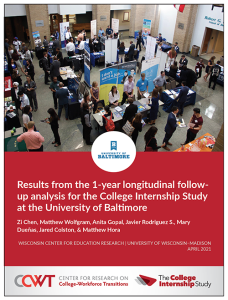 Chen, Z., Wolfgram, M., Gopal, A., Rodriguez S., J., Dueñas, M., Colston, J., & Hora, M. (2021). Results from the 1-year longitudinal follow-up analysis for the College Internship Study at the University of Baltimore. University of Wisconsin-Madison, Center for Research on College-Workforce Transitions.
Chen, Z., Wolfgram, M., Gopal, A., Rodriguez S., J., Dueñas, M., Colston, J., & Hora, M. (2021). Results from the 1-year longitudinal follow-up analysis for the College Internship Study at the University of Baltimore. University of Wisconsin-Madison, Center for Research on College-Workforce Transitions.
Summary: This report includes findings from the second round of data collection (Spring 2020 or T2) at the University of Baltimore for The College Internship Study. The data collected at T2 include follow-up interviews with 13 students and a follow-up online survey of 131 students who participated in the first round of data collection (Spring 2019 or T1). These data are analyzed to provide faculty, staff, and leadership at the University of Baltimore with evidence-based insights about the impacts of internship participation on students’ lives and careers. This second round of the College Internship Study is guided by the following research question: What are the changes concerning students’ internship experiences and outcomes comparing longitudinal data at two points in time?
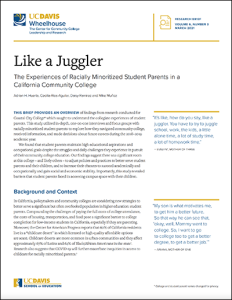 Huerta, A.H., Rios-Aguilar, C., Ramirez, D. & Munoz, M. (2021). Like a Juggler, the experiences of racially minoritized student parents in a California community college. Center for Community College Leadership and Research. University of California-Davis.
Huerta, A.H., Rios-Aguilar, C., Ramirez, D. & Munoz, M. (2021). Like a Juggler, the experiences of racially minoritized student parents in a California community college. Center for Community College Leadership and Research. University of California-Davis.
Abstract: This brief provides an overview of findings from research conducted for Coastal City College* which sought to understand the collegiate experiences of student parents. This study utilized in-depth, one-on-one interviews and focus groups with racially minoritized student parents to explore how they navigated community college, received information, and made decisions about future careers during the 2018–2019 academic year.
We found that student parents maintain high educational aspirations and occupational goals despite the struggles and daily challenges they experience in pursuit of their community college education. Our findings suggest there was significant room at this college – and likely others – to adjust policies and practices to better serve student parents and their children, and to increase their chances to succeed academically and occupationally and gain social and economic stability. Importantly, this study revealed barriers that student parents faced in accessing campus space with their children.
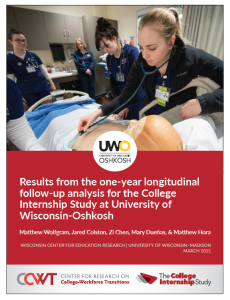 Wolfgram, M., Colston, J., Chen, Z., Dueñas, M., & Hora, M.T. (2021). Results from the one-year longitudinal follow-up analysis for the College Internship Study at University of Wisconsin-Oshkosh. Center for Research on College-Workforce Transitions.
Wolfgram, M., Colston, J., Chen, Z., Dueñas, M., & Hora, M.T. (2021). Results from the one-year longitudinal follow-up analysis for the College Internship Study at University of Wisconsin-Oshkosh. Center for Research on College-Workforce Transitions.
Summary: This report includes findings from the second round of data collection (Spring 2020 or T2) at the University of Wisconsin-Oshkosh (UW-Oshkosh) for The College Internship Study. The data collected at T2 include follow-up interviews with 11 students and a follow-up online survey of 149 students who participated in the first round of data collection (Spring 2019 or T1). These data are analyzed to provide faculty, staff, and leadership at UW-Oshkosh with evidence-based insights about the impacts of internship participation on students’ lives and careers. This second round of the College Internship Study at UW-Oshkosh is guided by the following research question: What are the changes concerning students’ internship experiences and outcomes comparing longitudinal data at two points in time?
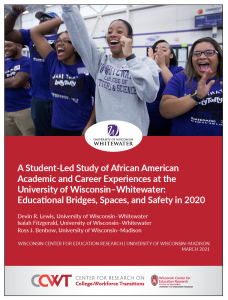 Lewis, D. R., Fitzgerald, I., & Benbow, R. J. (2021). A student-led study of African American academic and career experiences at the University of Wisconsin-Whitewater: Educational bridges, spaces, and safety in 2020. Center for Research on College-Workforce Transitions.
Lewis, D. R., Fitzgerald, I., & Benbow, R. J. (2021). A student-led study of African American academic and career experiences at the University of Wisconsin-Whitewater: Educational bridges, spaces, and safety in 2020. Center for Research on College-Workforce Transitions.
Summary: This report represents the findings from a student researcher-led project focused on the high school, college, and career preparation experiences of African American and Black college students at the University of Wisconsin–Whitewater (UWW), a predominantly White institution (PWI) in rural southeastern Wisconsin. With the goal of dismantling systemic barriers to equitable African American student college-to-career transitions, especially from PWIs, a team of three researchers designed and carried out a qualitative study to (1) collect African American student college and career narratives and (2) better understand African American students’ experiences at UWW. Key findings from the study include the elucidation of student perspectives on the strong connections between high school experiences, mostly in and around Milwaukee, and students’ college and career trajectories; the challenges involved in navigating campus spaces at a rural PWI; and the psychological, social, and educational effects of the COVID-19 pandemic, which is novel to 2020, and police racial profiling, which is not. The study also identifies key strategies for creating additional space for African American self-authorship, including through student organization advocacy and involvement, faculty and staff mentorships, and cross-campus and cross-community conversations.
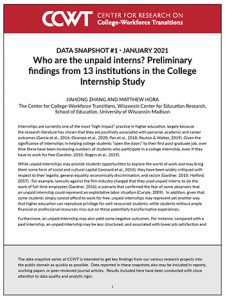 Zhang, J. & Hora, M.T. (2021). Who are the unpaid interns? Preliminary findings from 13 institutions in the College Internship Study. Data Snapshot #1. Center for Research on College-Workforce Transitions. University of Wisconsin-Madison.
Zhang, J. & Hora, M.T. (2021). Who are the unpaid interns? Preliminary findings from 13 institutions in the College Internship Study. Data Snapshot #1. Center for Research on College-Workforce Transitions. University of Wisconsin-Madison.
Internships are currently one of the most “high-impact” practice in higher education, largely because
the research literature has shown that they are positively associated with personal, academic and career outcomes (Garcia et al., 2016; Ocampo et al., 2020; Pan et al., 2018; Routon & Walker, 2019). Given the significance of internships in helping college students “open the doors” to their first post-graduate job, over time there have been increasing numbers of students who participate in a college internship, even if they have to work for free (Gardner, 2010; Rogers et al., 2019).
While unpaid internships may provide students opportunities to explore the world of work and may bring them some form of social and cultural capital (Leonard et al., 2016), they have been widely critiqued with respect to their legality, general equality, economically discrimination, and racism (Gardner, 2010; Holford, 2017). For example, lawsuits against the film industry charged that they used unpaid interns to do the work of full-time employees (Gardner, 2016), a scenario that confirmed the fear of some observers that an unpaid internship could represent an exploitative labor situation (Curiale, 2009). Continue reading.
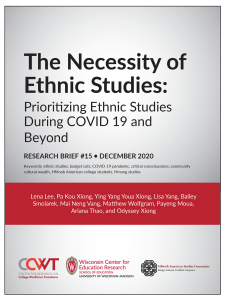 Lee, L., Xiong, P., Xiong, Y., Yang, L., Smolarek, B., Vang, M., Wolfgram, M., Moua, P., Thao, A. & Xiong, O. (2020). The Necessity of Ethnic Studies: Prioritizing Ethnic Studies During COVID 19 and Beyond. Center for Research on College-Workforce Transitions (Research Brief #16). University of Wisconsin–Madison, Wisconsin Center for Education Research.
Lee, L., Xiong, P., Xiong, Y., Yang, L., Smolarek, B., Vang, M., Wolfgram, M., Moua, P., Thao, A. & Xiong, O. (2020). The Necessity of Ethnic Studies: Prioritizing Ethnic Studies During COVID 19 and Beyond. Center for Research on College-Workforce Transitions (Research Brief #16). University of Wisconsin–Madison, Wisconsin Center for Education Research.
Abstract: The Covid-19 pandemic has caused a devastating ripple effect on educational institutions—from budget cuts to health and safety concerns to changes in learning environments. In higher education specifically, Covid-19 is disrupting student lives by interrupting in-person learning, forcing students out of their living spaces, and causing students to suffer financially. The consequences of the pandemic have also led to financial crises for universities, causing administrators to make challenging budgetary decisions. Unfortunately, during times of budget scarcity, colleges and universities have historically opted—and continue to opt—for cuts that impact students of color profoundly, including deep cuts to diversity and inclusion efforts and ethnic studies programs, suspensions of ethnic studies faculty hiring, and even resulting in the termination of tenure-track faculty positions in ethnic studies (Bikales & Chen, 2020; Meyerhofer, 2020; Myers, 2014; Wang, 2016).
University administrators are currently having to make hard financial decisions which will have lasting impacts on students, staff, and their communities. Within this looming financial crisis, with multiple competing priorities and far less resources than in the past, in this report, we argue that ethnic studies programs must be prioritized for continued investment. Continued.
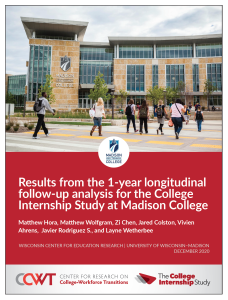 Hora, M. T., Wolfgram, M., Chen, Z., Colston, J., Ahrens, V., Rodriguez S., J., & Wetherbee, l. (2020). Results from the 1-year longitudinal follow-up analysis for the College Internship Study at Madison College. Center for Research on College-Workforce Transitions.
Hora, M. T., Wolfgram, M., Chen, Z., Colston, J., Ahrens, V., Rodriguez S., J., & Wetherbee, l. (2020). Results from the 1-year longitudinal follow-up analysis for the College Internship Study at Madison College. Center for Research on College-Workforce Transitions.
Summary: This report includes findings from the second round of data collection (Spring 2019 or T2) at Madison College for The College Internship Study, which is a national mixed-methods longitudinal study of internship programs conducted by the Center for Research on College-Workforce Transitions (CCWT) at the University of Wisconsin-Madison (UW-Madison). The data collected at T2 of the study include follow-up interviews with 8 students and a follow-up online survey of 147 students who participated in the first round of data collection (Spring 2018 or T1). These data are analyzed to provide faculty, staff, and leadership at Madison College with evidence-based insights about the impacts of internship participation on students’ lives and careers. Thus, this second round of the College Internship Study at Madison College is guided by the following research question: What are the changes concerning students’ internship experiences and outcomes comparing longitudinal data at two time points?
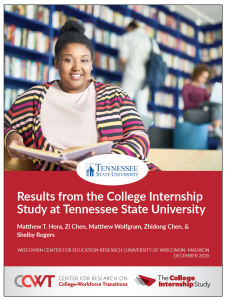 Hora, M. T., Chen, Z., Wolfgram, M., Chen, Z., & Rogers, S. (2020). Results from the College Internship Study at Tennessee State University. Center for Research on College-Workforce Transitions.
Hora, M. T., Chen, Z., Wolfgram, M., Chen, Z., & Rogers, S. (2020). Results from the College Internship Study at Tennessee State University. Center for Research on College-Workforce Transitions.
Summary: This report includes findings from the first round of data collection (Spring 2020) at Tennessee State University (TSU) for The College Internship Study, which is a national mixed-methods longitudinal study of internship programs conducted by the Center for Research on College-Workforce Transitions (CCWT) at the University of Wisconsin-Madison (UW-Madison). The findings are based on an interdisciplinary sample of students who took an online survey (n = 252), interviews with students who have and who have not had an internship experience (n = 9), and interviews with career advisors, faculty, and employers (n = 7). We would like to thank TSU for allowing our research team to conduct this study with your students, faculty, and community members, and hope that our findings are useful as you work towards improving internships and work-based learning for your students. As our research moves into its second year, we will focus on the impacts of the COVID-19 pandemic on the students, faculty and staff at TSU and employer partners with respect to internships and students’ overall experiences with the pandemic and its impacts on their studies and career goals.
Four research questions guide our study: (1) How many students are participating in internship programs, and does participation vary by student demographics, academic status, or life/employment situation? (2) What barriers exist for students to participate in internship programs? (3) What is the structure and format of internship programs? And, (4) How, if at all, is program structure and format associated with student satisfaction with their internships and their estimation of the value of the internship for their career development? In addition, given the timing of our interviews (Spring 2020), we also were interested in understanding TSU students’ experiences related to the COVID-19 pandemic.
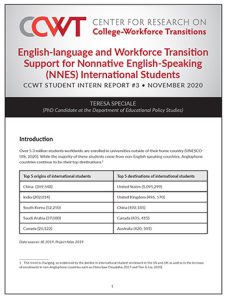 English-language and Workforce Transition Support for Nonnative English-Speaking (NNES) International Students. Speciale, T. (2020). Center for Research on College-Workforce Transitions Student Report #3. University of Wisconsin-Madison.
English-language and Workforce Transition Support for Nonnative English-Speaking (NNES) International Students. Speciale, T. (2020). Center for Research on College-Workforce Transitions Student Report #3. University of Wisconsin-Madison.
Introduction: Over 5.3 million students worldwide are enrolled in universities outside of their home country (UNESCO UIS, 2020). While the majority of these students come from non-English speaking countries, Anglophone countries continue to be their top destinations.
International students are drawn to foreign universities in search of credentials and academic and career opportunities unavailable in their home countries (ITA, 2016). The majority pursue degrees in STEM fields (in particular engineering, math, and computer science), followed closely by Business and Management (IIE, 2019). A prerequisite for admission to an English-speaking institution of higher education is English language proficiency, determined by standardized tests such as the Test of English as a Foreign Language (TOEFL) and the International English Language Testing System (IELTS). Continue reading.
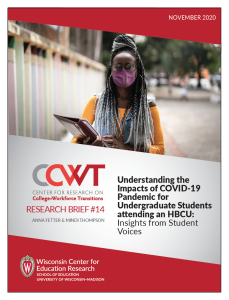 Fetter, A & Thompson, M. (2020). Understanding the Impacts of COVID-19 Pandemic for Undergraduate Students attending an HBCU: Insights from Student Voices. Center for Research on College-Workforce Transitions (Research Brief #14). University of Wisconsin–Madison, Wisconsin Center for Education Research.
Fetter, A & Thompson, M. (2020). Understanding the Impacts of COVID-19 Pandemic for Undergraduate Students attending an HBCU: Insights from Student Voices. Center for Research on College-Workforce Transitions (Research Brief #14). University of Wisconsin–Madison, Wisconsin Center for Education Research.
Executive Summary: Limited attention has been paid to the impact of COVID-19 on college students who are attending minority-serving institutions, despite the disproportionate toll COVID-19 has on minoritized communities and the worsening of pre-existing inequity brought about by the pandemic (Kantamneni, 2020; Kimbrough, 2020; Strada, 2020). It is vital to understand experiences with COVID-19 among college students who are attending Historically Black Colleges and Universities (HBCUs), which serve as primary educational pathways for Black students in the U.S. Themes from our interviews with 41 students attending an HBCU highlight that students are experiencing significant work-related, academic, financial, and socio-emotional challenges related to COVID-19. Stressors and concerns were viewed by students as interrelated and cumulative. In addition, themes from the interviews suggested that student stressors must be viewed within the contexts of the higher education institution, student life experiences and circumstances, and their positionality within large structural systems. Given the far-ranging and ongoing impacts of COVID-19 on higher education, this Research Brief concludes with recommendations to advocate for and support students.
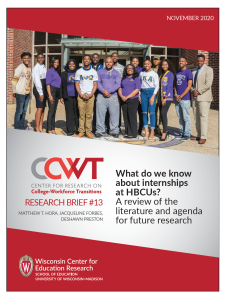 Hora, M., Forbes, J., & Preston, D. (2020). What do we know about internships at HBCUs? A review of the literature and agenda for future research. Center for Research on College-Workforce Transitions (Research Brief #13). University of Wisconsin–Madison, Wisconsin Center for Education Research.
Hora, M., Forbes, J., & Preston, D. (2020). What do we know about internships at HBCUs? A review of the literature and agenda for future research. Center for Research on College-Workforce Transitions (Research Brief #13). University of Wisconsin–Madison, Wisconsin Center for Education Research.
Abstract: Internships and other high-impact practices (HIPs) that feature experiential learning are being increasingly promoted at Historically Black Colleges & Universities (HBCUs) as a way to support students’ career and academic success. In this paper we review the literature on what is known about HIPs and internships at HBCUs and how students’ racial identities have influenced interns’ experiences and outcomes. Our analysis finds little empirical research on internships at HBCUs and a general lack of in-depth and critical analysis on the ways that racial identity and the unique institutional cultures of HBCUs impact internships and Black student experiences. We then review contextual forces salient to Black interns’ experiences such as pervasive workplace discrimination, and theoretical frameworks that could inform future research on the ways that race, culture, institutional features and local “field effects” interact to shape student experiences and professional development. We conclude by outlining a research agenda for studying internships that foregrounds issues of racial justice, adopts elements of Bourdieu’s relational sociology, and investigates how the unique cultures of HBCUs influence how internships are designed, implemented and experienced.
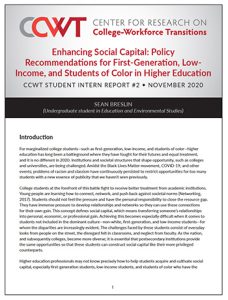 Enhancing Social Capital: Policy Recommendations for First-Generation, Low-Income, and Students of Color in Higher Education. Breslinang, S. (2020). Center for Research on College-Workforce Transitions Student Report #2. University of Wisconsin-Madison.
Enhancing Social Capital: Policy Recommendations for First-Generation, Low-Income, and Students of Color in Higher Education. Breslinang, S. (2020). Center for Research on College-Workforce Transitions Student Report #2. University of Wisconsin-Madison.
Introduction: For marginalized college students—such as first-generation, low-income, and students of color—higher education has long been a battleground where they have fought for their futures and equal treatment, and it is no different in 2020. Institutions and societal structures that shape opportunity, such as colleges and universities, are being challenged. Amidst the Black Lives Matter movement, COVID-19, and other events; problems of racism and classism have continuously persisted to restrict opportunities for too many students with a new essence of publicity that we haven’t seen previously.
College students at the forefront of this battle fight to receive better treatment from academic institutions. Young people are learning how to connect, network, and push back against societal norms (Networking, 2017). Students should not feel the pressure and have the personal responsibility to close the resource gap. They have immense pressure to develop relationships and networks so they can use these connections for their own gain. This concept defines social capital, which means transferring someone’s relationships into personal, economic, or professional gain. Achieving this becomes especially difficult when it comes to students not included in the dominant culture—non-white, first-generation, and low-income students—for whom the disparities are increasingly evident. The challenges faced by these students consist of everyday looks from people on the street, the disregard felt in classrooms, and neglect from faculty. As the nation, and subsequently colleges, become more diverse; it is essential that postsecondary institutions provide the same opportunities so that these students can construct social capital like their more privileged counterparts. Continue reading.
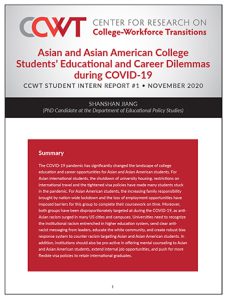 Asian and Asian American college students’ educational and career dilemmas during Covid-19. Jiang, S. (2020). Center for Research on College-Workforce Transitions Student Report #1. University of Wisconsin-Madison.
Asian and Asian American college students’ educational and career dilemmas during Covid-19. Jiang, S. (2020). Center for Research on College-Workforce Transitions Student Report #1. University of Wisconsin-Madison.
Summary: The COVID-19 pandemic has significantly changed the landscape of college education and career opportunities for Asian and Asian American students. For Asian international students, the shutdown of university housing, restrictions on international travel and the tightened visa policies have made many students stuck in the pandemic. For Asian American students, the increasing family responsibility brought by nation-wide lockdown and the loss of employment opportunities have imposed barriers for this group to complete their coursework on time. Moreover, both groups have been disproportionately targeted at during the COVID-19, as anti-Asian racism surged in many US cities and campuses. Universities need to recognize the institutional racism entrenched in higher education system, send clear anti-racist messaging from leaders, educate the white community, and create robust bias response system to counter racism targeting Asian and Asian American students. In addition, institutions should also be pro-active in offering mental counseling to Asian and Asian American students, extend internal job opportunities, and push for more flexible visa policies to retain international graduates.
